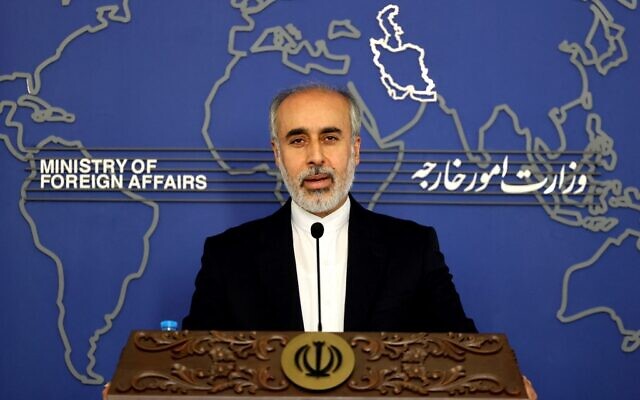TEHRAN — Iran’s foreign ministry on Saturday described as “unconstructive” and “regrettable” a joint statement issued by Germany, France and Britain about negotiations aimed at reviving a 2015 nuclear deal.
“It is surprising and regrettable that, in a situation where diplomatic interactions and exchanges of messages are continuing… to finalize the negotiations,” the three European parties would issue such an “unconstructive” statement, Iran’s foreign ministry spokesman Nasser Kanani said.
The remarks came after the trio of nations raised “serious doubts” about Iran’s sincerity in seeking a revived nuclear agreement and warned that the Islamic Republic’s position was jeopardizing the prospects of reaching a deal. The so-called E3 also warned that Iran “continues to escalate its nuclear program way beyond any plausible civilian justification.”
“The three European countries are advised to play a more active role to provide a solution to end the few remaining disagreements instead of entering the phase of destroying the diplomatic process,” Kanani said.
The three European parties to the deal said Saturday that Tehran “has chosen not to seize this critical diplomatic opportunity,” adding that “instead, Iran continues to escalate its nuclear program way beyond any plausible civilian justification.”
Tehran has also reopened issues related to its legally binding obligations under the Non-Proliferation Treaty that was concluded with the UN atomic energy watchdog IAEA, they added.
Iran has demanded that the International Atomic Energy Agency close its investigation into several undeclared nuclear sites, a non-starter for Western powers.
Kanani said it was “regrettable that the three European countries have taken a step in the path of the Zionist regime to defeat the negotiations with this ill-considered statement,” referring to Israel, a staunch opponent of the deal.
“If such an approach continues, they must also accept responsibility for its results,” he said.
The 2015 agreement, known formally as the Joint Comprehensive Plan of Action or JCPOA, gave Iran sanctions relief in return for restricting its nuclear program.
But in 2018, then-US president Donald Trump withdrew the US from the deal and began reimposing biting sanctions, prompting Tehran to roll back on its commitments under the agreement.
The negotiations in Vienna since April 2021 have aimed to restore the deal by lifting the sanctions on Tehran once again and pushing Iran to fully honor its obligations.
Last month, the European Union, which acts as the mediator of the talks, put forward a “final” draft of the agreement.
Iran and the US then took turns to respond to the text, with Washington saying on Friday that Iran’s latest reply was a step “backwards.”
Kanani said Saturday that “threats and sanctions” would not “prevent the Iranian people from pursuing their rights and securing their interests.”
Do you rely on The Times of Israel for accurate and insightful news on Israel and the Jewish world? If so, please join The Times of Israel Community. For as little as $6/month, you will:
That’s why we started the Times of Israel ten years ago – to provide discerning readers like you with must-read coverage of Israel and the Jewish world.
So now we have a request. Unlike other news outlets, we haven’t put up a paywall. But as the journalism we do is costly, we invite readers for whom The Times of Israel has become important to help support our work by joining The Times of Israel Community.
For as little as $6 a month you can help support our quality journalism while enjoying The Times of Israel AD-FREE, as well as accessing exclusive content available only to Times of Israel Community members.
Thank you, David Horovitz, Founding Editor of The Times of Israel

